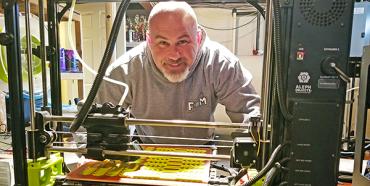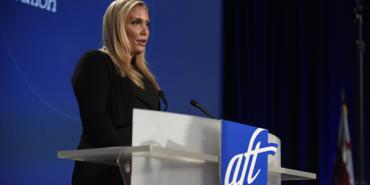So many AFT members are longtime heroes, habitually putting their students, their patients and members of the public before their own needs, working to make sure their communities have what they need to thrive on a daily basis. The coronavirus pandemic and the poor state of the economy have brought this heroism to a whole new level, as members face unprecedented challenges—and meet them with the energy, determination, courage and creativity that has become the hallmark of their union.
Here are the stories of two heroes who shared their experiences on July 29 at the AFT convention on video.
Filling an urgent need
Watching the video, you can tell that Michael Shunney, an industrial technology teacher at West Warwick High School in Rhode Island, is inspired by his work and proud of his students. Working together, they have used 3D printers to make hundreds of face shields that are now protecting frontline workers—from firefighters, hospital staff and visiting nurses to people distributing food from local schools.
The idea came to Shunney as he began teaching his Introduction to Engineering class remotely: The topic was 3D printers, and he asked the students if they felt prepared to make their own 3D masks. He found a medically approved design from the 3D print-making community, and the idea took off. Shunney’s union, the West Warwick Teachers Alliance, supplied the materials; the school district donated printers; four students turned their homes into 3D print-making centers; and other students and educators pitched in to help. Now the teams have made hundreds of face shields for a grateful community.
“This is life-saving,” says Judy Thorpe, a registered nurse and chief nursing officer at Kent Hospital, where staff are using the face shields from the school program. “It’s more valuable than gold.”
“When I took 30 face shields to the West Warwick firefighters, they were so appreciative,” says student Seth Giguere. “It’s an amazing feeling to think that we’re protecting the people who don’t have the coronavirus and who are caring for other people on the frontlines, and that keeps it from spreading.”
“This is going to go down in the history books,” says Shunney. “Everyone who is helping out right now can say that they helped out a little bit to prevent the spread [of the virus] or keep someone safe.”
Braving the fight against student debt
The work that member Katie Hyland is doing is equally altruistic but addresses an entirely different crisis: student debt. Hyland, a middle school English and language arts teacher in New York City and a member of United Federation of Teachers, is one of a group of AFT members who brought a lawsuit against Navient, one of the largest student loan servicers. The suit challenged how Navient was advising borrowers about Public Service Loan Forgiveness—a program that forgives student loan debt for qualifying public service workers who make 10 years’ worth of payments on their loans. As a result of a settlement announced in June, Navient has agreed to provide more information about the program to its borrowers, and to pay $1.75 million to a nonprofit organization to provide student loan counseling and education to borrowers who work in public service.
Hyland’s efforts will make a huge difference for countless borrowers to come. “There is finally some hope not just for myself but for thousands of other people that were eligible for Public Service Loan Forgiveness and had found themselves in the same situation that I was in,” she says.
Before the lawsuit, Navient told Hyland she was all set to receive PSLF, as the loan forgiveness program is commonly known. Nine years later, when she was getting ready to file for forgiveness, she found out that Navient was wrong, and she had to start all over again.
“It felt like I had been punched in the stomach and all the air had been taken out,” she recalls. “I felt hopeless and I felt like I was back at square one with no one to help me or guide me.” Because of her debt, she’s been unable to afford tuition to become a school administrator or earn credentials as a special education teacher, and she hasn’t been able to purchase her own home.
“Even though I knew that this would be a real hardship for myself and for my family, I have always taught my own children and my students to do the right thing and to stand up for other people when they’re not being treated fairly,” she says. “I couldn’t pass up this chance to speak up and to use the information and the experiences that I’ve had to stop this from happening to people who just want to do good in the world.”
[Virginia Myers]


